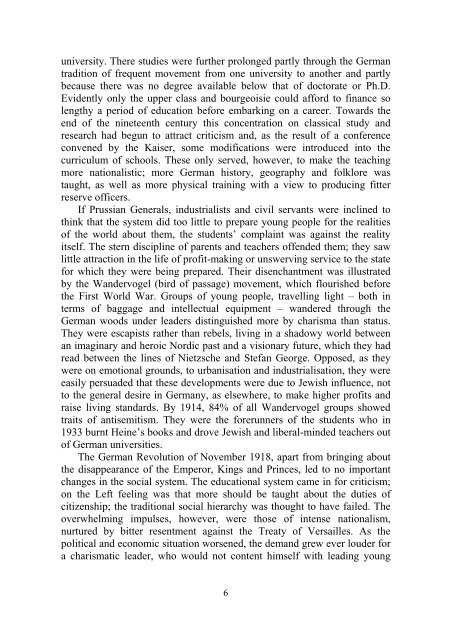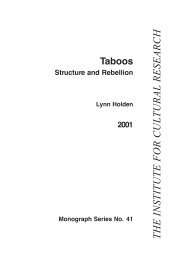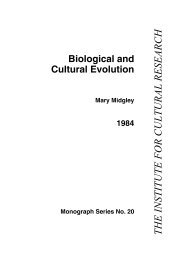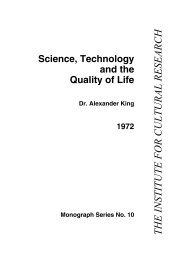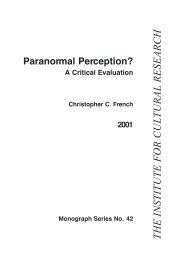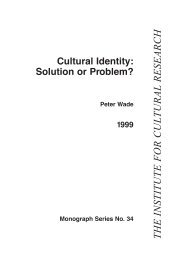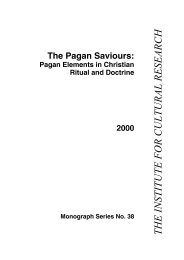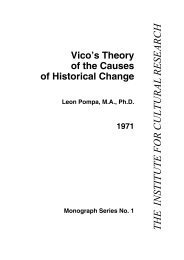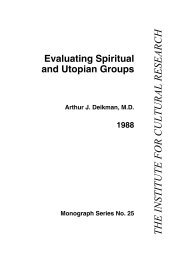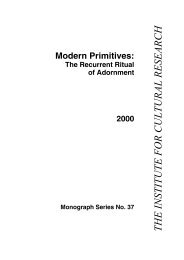Education and Elitism in Nazi Germany - The Institute For Cultural ...
Education and Elitism in Nazi Germany - The Institute For Cultural ...
Education and Elitism in Nazi Germany - The Institute For Cultural ...
Create successful ePaper yourself
Turn your PDF publications into a flip-book with our unique Google optimized e-Paper software.
university. <strong>The</strong>re studies were further prolonged partly through the German<br />
tradition of frequent movement from one university to another <strong>and</strong> partly<br />
because there was no degree available below that of doctorate or Ph.D.<br />
Evidently only the upper class <strong>and</strong> bourgeoisie could afford to f<strong>in</strong>ance so<br />
lengthy a period of education before embark<strong>in</strong>g on a career. Towards the<br />
end of the n<strong>in</strong>eteenth century this concentration on classical study <strong>and</strong><br />
research had begun to attract criticism <strong>and</strong>, as the result of a conference<br />
convened by the Kaiser, some modifications were <strong>in</strong>troduced <strong>in</strong>to the<br />
curriculum of schools. <strong>The</strong>se only served, however, to make the teach<strong>in</strong>g<br />
more nationalistic; more German history, geography <strong>and</strong> folklore was<br />
taught, as well as more physical tra<strong>in</strong><strong>in</strong>g with a view to produc<strong>in</strong>g fitter<br />
reserve officers.<br />
If Prussian Generals, <strong>in</strong>dustrialists <strong>and</strong> civil servants were <strong>in</strong>cl<strong>in</strong>ed to<br />
th<strong>in</strong>k that the system did too little to prepare young people for the realities<br />
of the world about them, the students’ compla<strong>in</strong>t was aga<strong>in</strong>st the reality<br />
itself. <strong>The</strong> stern discipl<strong>in</strong>e of parents <strong>and</strong> teachers offended them; they saw<br />
little attraction <strong>in</strong> the life of profit-mak<strong>in</strong>g or unswerv<strong>in</strong>g service to the state<br />
for which they were be<strong>in</strong>g prepared. <strong>The</strong>ir disenchantment was illustrated<br />
by the W<strong>and</strong>ervogel (bird of passage) movement, which flourished before<br />
the First World War. Groups of young people, travell<strong>in</strong>g light – both <strong>in</strong><br />
terms of baggage <strong>and</strong> <strong>in</strong>tellectual equipment – w<strong>and</strong>ered through the<br />
German woods under leaders dist<strong>in</strong>guished more by charisma than status.<br />
<strong>The</strong>y were escapists rather than rebels, liv<strong>in</strong>g <strong>in</strong> a shadowy world between<br />
an imag<strong>in</strong>ary <strong>and</strong> heroic Nordic past <strong>and</strong> a visionary future, which they had<br />
read between the l<strong>in</strong>es of Nietzsche <strong>and</strong> Stefan George. Opposed, as they<br />
were on emotional grounds, to urbanisation <strong>and</strong> <strong>in</strong>dustrialisation, they were<br />
easily persuaded that these developments were due to Jewish <strong>in</strong>fluence, not<br />
to the general desire <strong>in</strong> <strong>Germany</strong>, as elsewhere, to make higher profits <strong>and</strong><br />
raise liv<strong>in</strong>g st<strong>and</strong>ards. By 1914, 84% of all W<strong>and</strong>ervogel groups showed<br />
traits of antisemitism. <strong>The</strong>y were the forerunners of the students who <strong>in</strong><br />
1933 burnt He<strong>in</strong>e’s books <strong>and</strong> drove Jewish <strong>and</strong> liberal-m<strong>in</strong>ded teachers out<br />
of German universities.<br />
<strong>The</strong> German Revolution of November 1918, apart from br<strong>in</strong>g<strong>in</strong>g about<br />
the disappearance of the Emperor, K<strong>in</strong>gs <strong>and</strong> Pr<strong>in</strong>ces, led to no important<br />
changes <strong>in</strong> the social system. <strong>The</strong> educational system came <strong>in</strong> for criticism;<br />
on the Left feel<strong>in</strong>g was that more should be taught about the duties of<br />
citizenship; the traditional social hierarchy was thought to have failed. <strong>The</strong><br />
overwhelm<strong>in</strong>g impulses, however, were those of <strong>in</strong>tense nationalism,<br />
nurtured by bitter resentment aga<strong>in</strong>st the Treaty of Versailles. As the<br />
political <strong>and</strong> economic situation worsened, the dem<strong>and</strong> grew ever louder for<br />
a charismatic leader, who would not content himself with lead<strong>in</strong>g young<br />
6


